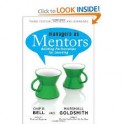
How many bosses have made a difference in your life?
You probably remember your very best, and your very worst, bosses.
What was the difference between the two?
It’s interesting, when asked what makes a good manager people often cite intellect and job skills.
Yet when people are asked to describe their own very fabulous or very horrible bosses, they rarely discuss how the boss performed their own job. Instead, they talk about how the boss interacted with them, the employee. The relationship people have with their boss determines whether they perceive him or her positively or negatively.
My very worst boss ignored your phone calls, cancelled one on one meetings, never gave any praise, and every conversation revolved around him.
My very best boss was the exact opposite. He was readily available, he noticed what you did well, and he made it clear that helping me develop was critically important.
He was, and still is, a true mentor.
In an era where efficiency is measured by the nanosecond and quarterly earnings trump long-term talent development, many managers find it hard to take the time or cultivate the skills to mentor employees.
Marshall Goldsmith, who is most frequently referred to as America’s CEO coach and is recognized as the number 1 leadership thinker in the world says, “As workforce has flattened, and demands have escalated, mentoring seems to have fallen out of favor.”
Yet after a decade of cutbacks and what have you done for me lately management, Goldsmith says the concept of coaching and mentoring is experiencing a rebirth because “CEOs are talking about their own mentors. They talk about how these mentors have impacted their lives.”
Yet Goldsmith adds, “As the need (for mentoring) has increased, the time available (for mentoring) has decreased.”
Goldsmith and best-selling business author Chip Bill address the challenges of mentoring
in their new book, Managers as Mentors: Building Partnerships for Learning.
Based on Bell’s previous book by the same title, the new version provides tips for rapid fire mentoring.
Bell and Goldsmith say it’s important for mentors to do it efficiently and not allow it to suck in large amounts of time. Several short interactions, they suggest, are better than one long one.
I’ve been mentored by both Bell and Goldsmith over the last decade, and I can tell you, they both practice what they preach.
They recommend frank communication. Goldsmith says, “In the mentoring relationship, don’t fake it, be honest.” He is very clear on what he doesn’t do. If asked for advice on an area that is not his expertise he says, “I’m not an expert on this topic.”
Authenticity is also required from mentees. Goldsmith says, “If your goal is to just try to impress the mentor you won’t learn much. And if you are trying to impress mentors in areas where you don’t know much, the mentors will ask questions, and you will be revealed.”
It’s tempting to want to pursue a powerful mentor that you can impress, but the true value of the mentoring partnership is learning.
A mentor doesn’t have to be your boss. Bell and Goldsmith suggest looking for someone outside your immediate manager.
In an often harsh, frequently short-term-focused world, effective mentoring is a slice of kindness and humanity that makes good strategic sense.
It may seem like you don’t have time for developing relationships and mentoring. But what’s the long-term cost of not doing it?